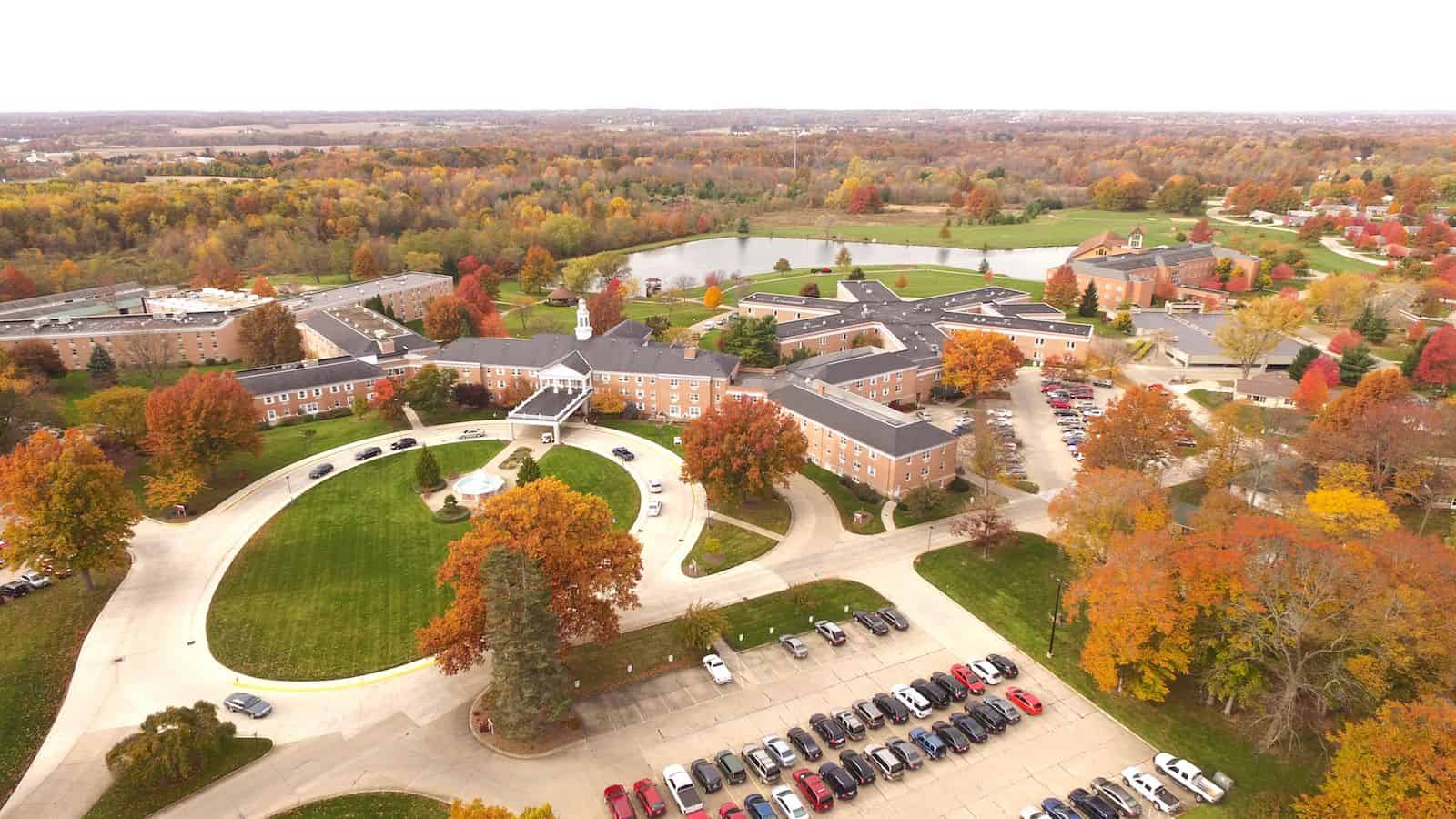Alzheimer's Care at Copeland Oaks
Copeland Oaks senior retirement community provides memory care for residents with Alzheimers and dementia.Compassionate Care & Support
If you find you are not able to give your loved one with dementia the time and attention it requires, it is probably the right time to consider support services. Facilities like Copeland Oaks can offer a customized treatment program, a healthy diet, 24-hour support and supervision, and social activities to give your loved one dependable quality of life.
Levels of Care for Seniors
Specialized Elder Day Care – Specialized adult day care for persons with early-stage cognitive impairment can offer daytime supervision for their loved ones so caregivers can maintain employment, manage a household and manage chores. It also offers individuals an important opportunity to socialize and participate in activities with other seniors their age.
Independent Living Communities – This basic level of senior living is only intended for residents still capable of living independently. No assistance with daily living activities is needed and social and recreational opportunities are abundant! For couples who have different medical needs, many retirement communities allow one spouse to live independently while still providing specialized care for the other spouse that requires additional support.
Assisted Living – This intermediate level of care that offers more hands-on assistance with activities of daily living. Assisted living may offer options add-on care services at additional cost. However, skilled nursing care and 24/7 supervision are not often included.
Specialized Memory Care – The goal of all memory care facilities is to provide long-term residential care that addresses the needs of residents with moderate- to late-stage dementia. The staff who work in this level of senior living are specially-trained in dementia care. They are trained to recognize the subtle signs that can indicate changes in mental and physical health. They also understand the difficult behaviors dementia patients can exhibit and how to de-escalate them.
One of the greatest benefits that memory care units offer is an increased level supervision and a secure property to prevent seniors from wandering. Memory care facilities also offer activities and social programs that are adapted to address the abilities and meet the needs of dementia patients.
Specific Alzheimer’s Care
Memory Activities
Planning activities for a loved one with memory loss can be difficult. Below are some activities we recommend and use in our own facilities.
Music Therapy – This is one of the simplest and most cost-effective ways we engage your loved one with dementia. Simply create playlists of their favorite songs to help set a mood:
- Upbeat songs can get them energized
- Slow, meditative songs can help them calm and wind down
- Consider karaoke time too – where everyone can sing along

Art Therapy – Painting, drawing, and ceramics can give someone with Alzheimer’s a sense of self-expression and accomplishment. Creating a life story book or memory box that includes favorite objects, pictures, and keepsakes is a meaningful project that can be passed down to family. Offer encouragement and give them plenty of time and space if they need it to finish their work. Use non-toxic materials, avoid sharp tools, but keep the project on an adult level.
Gardening is an excellent way to get out of the house, enjoy the sunshine, and watch plants and flowers grow. If possible, give them their own patch in the yard, or several pots by a window can garden indoors, where they can plant whatever seeds they like.
Walking and hiking through the neighborhood or public park is a great sensory activity for dementia patients – allowing them to get some light exercise into their daily routine.
Reading – Books and magazines can be a good way to keep a loved one with dementia engaged. Find books that have large type and lots of colorful pictures (not children’s picture books). Audio books are a smart choice too.
Simple Games – Playing cards, jigsaw puzzles, dominos, dice, and word puzzles are games that can be easily adapted as recreational activities for loved ones with dementia.

Security
Alzheimer’s disease and dementia cause a number of physical and mental changes that may impact your loved one’s safety. Depending on the stage of the disease, these can include:
Behavior – They may become paranoid, fearful and easily confused.
Physical ability – They may demonstrate trouble with balance.
Judgment – They may forget how to use household appliances.
Sense of time and place – They may become lost in their own neighborhood.
Senses – They may experience changes in vision and hearing, as well as sensitivity temperature shifts and issues with depth perception.
Memory care is typically provided in a dedicated facility, in a secure wing of an assisted living facility or at a continuing care campus that offers multiple levels of care in one location.
Copeland Oaks to make sure Memory Care residents have a safe, secure environment. You’ll find some Memory Care services located in secluded in a wing of our Assisted Living building. Residents have the same accommodations, access and on-site clinic that Assisted Living residents do. The biggest difference is an extra level of supervision and safety for our
Memory Care residents:
- Certified Dementia Care Practitioners available 24/7
- Security cameras in all common areas
- Doors that alert the staff as residents are coming and going
- Facility is decked out with non-slip flooring, heavy-duty furniture and grab bars to prevent falls

Food
Overeating and undereating are both a common problem for individuals with dementia.
If someone with dementia is overeating, they may eat foods that aren’t appropriate or even things that aren’t food. On the other hand, those with Alzheimer’s disease may also lose weight because people with dementia often wander and pace – causing them to burn more calories than typical seniors.
Here are some guidelines for nutrition and diet for persons with dementia:
- Keep a healthy weight
- Cut down on sugar
- Avoid eating too much salt
- Drink plenty of water
- Eat a variety of foods – especially fruits and vegetables, whole grains, lean protein, and low-fat dairy
- Limit foods with high saturated fat and cholesterol, like fatty meats and fried foods.
The dining experience at Copeland Oaks is designed to encourage healthy social engagement and it’s always centered around healthy nutrition in reasonable portions. Memory care residents have special dietary needs and Copeland Oaks dieticians and culinary specialists cater to all of them. In fact, the team will often add nutritional supplements to soups and similar foods to ensure that meals are packed full of the right nutritional requirements for every resident. Memory Care residents eat together – allowing for socialization and building a sense of community. Plenty of time is allotted for meals too, so Memory Care residents don’t feel rushed, making for an overall pleasant experience residents look forward to.
Best Place for Alzheimer Care in Ohio
You will find a number of Alzheimer’s care and dementia care options in Ohio. Search for a facility that will provide a secure, supportive environment for your loved one. Not all assisted living facilities offer services specifically designed for people with dementia, so it is important to ask. While memory care facilities are available throughout the state, choosing one that can transition residents from assisted living to memory care — like the Donald R. James Assisted Living Memory Care Wing at Copeland Oaks — offers the best solution for Alzheimer’s and dementia patients.
The Donald R. James Assisted Living Memory Care Wing at Copeland Oaks

In addition to the Donald R. James Assisted Living Memory Care Wing, Copeland’s campus also provides memory care services for those with late or later stages of Alzheimer’s and dementia.
Get in Touch
Most seniors will eventually need help with daily living routines — bathing, dressing meal preparation, shopping, getting to appointments and more. And many busy families are simply not prepared to provide this level of care for the older family members in their lives. Plan a visit to the Donald R. James Assisted Living Memory Care Wing at Copeland Oaks. We’d be happy to offer a tour. Call 330.938.1093.
If you are interested in learning more about Assisted Living & Memory Care – contact Copeland Oaks to learn more about our living options and even schedule a tour.
